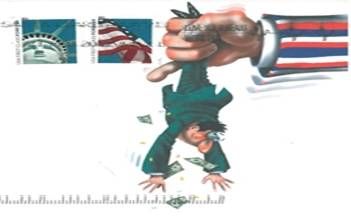 Here’s the catch: You receive a call from someone claiming to be an attorney or calling from the “collections
department” of a law firm about an urgent matter. They then tell you that there’s a debt you owe and, without providing any proof that you owe, they try to squeeze a payment from you over the phone. When you refuse to pay, the caller tries to intimidate you
by threatening to send an officer out to arrest you or claiming they will sue. Sounds horrific? Well these are the types of practices many consumers were subjected to who came in contact with National Attorney Collection Services, Inc. (“NACS”).
Here’s the catch: You receive a call from someone claiming to be an attorney or calling from the “collections
department” of a law firm about an urgent matter. They then tell you that there’s a debt you owe and, without providing any proof that you owe, they try to squeeze a payment from you over the phone. When you refuse to pay, the caller tries to intimidate you
by threatening to send an officer out to arrest you or claiming they will sue. Sounds horrific? Well these are the types of practices many consumers were subjected to who came in contact with National Attorney Collection Services, Inc. (“NACS”).
NACS is a Southern California collection agency headed by Archie Donovan, who also does business as National Attorneys, National Attorney Service, NAS, and Abogados Nacionales. NACS typically collects debts for payday loan companies and businesses that finance
Spanish-speaking customers. Although you wouldn’t know it by their name, neither NACS nor its principals are attorneys, paralegals, legal assistants, or a law firm, as implied. They rarely, if ever, identified themselves as debt collectors in the initial contact
with consumers and failed to inform them that any information obtained would be used to collect a debt, as required by the
Fair Debt Collection Practices Act (“FDCPA”). Their egregious tactics were so heinous, it led to a
complaint filed by the
Federal Trade Commission (“FTC”) and a
one million dollar settlement. NACS currently has 74 complaints with Business Consumer Alliance (BCA) and a
rating of F.
The Glendale-based company contacted numerous consumers claiming they had outstanding debts and demanded immediate payment to settle them. NACS threatened consumers who failed to turn over payment with arrest, imprisonment, and/or wage garnishment, although
NACS had no intention or the ability to follow through with the threats. They often falsely claimed there is pending legal action against the debtor, or threatened to send law enforcement to consumers’ homes to serve them with legal papers.
Various complaints paint a picture of how far the representatives will go with their nefarious collection practices, oftentimes acting illegally. An Ohio gentlemen claims NACS called him demanding he pay them over $700 within a day or NACS would file charges
and have him arrested. The intimidation didn’t stop there. NACS’s representative threatened to garnish his wages and when he requested a validation letter, they refused, claiming they weren’t obligated to provide him with one.
The FTC complaint revealed that NACS repeatedly sent text messages to supposed debtors, their family and acquaintances, or, in some cases, strangers. The message included the debtors name, a case number, and a message that it is URGENT to call National Attorney
Service regarding a sensitive matter. The messages didn’t disclose that NACS was a debt collector and failed to inform the recipient of their legal rights in connection with the FDCPA, such as informing the recipient that they could dispute the debt, details
about the debt, and the name of the creditor.
An Indiana consumer received text messages about a supposed debt, as well as blocked calls to her residence and place of employment. She too asked for proof of the debt to be mailed to her because she disputed the debt. NACS failed to provide any proof and
instead demanded immediate payment or the debt would be more than tripled if not paid by the following day.
The deceptive practices spilled over into their mailings as well. Numerous collection letters were sent bearing unlawful symbols on their envelopes, such as the following:

The law doesn’t allow debt collectors to publicly disclose a person’s private debts. Mailing envelopes can include only the name and address of the company, and cannot indicate that the consumer may owe a debt.
NACS representatives also unlawfully revealed details about the debt to friends, family, co-workers, and strangers and at times claimed the debtor had committed fraud and would be arrested, sued, or worse. They allegedly represented themselves as attorneys
to these third parties and sometimes threatened to bring them into court if the debt wasn’t paid. NACS continued to contact many of these individuals after being asked to stop, and refused to cease until the debt was settled.
NACS often skirted requests to provide their corporate address, fax number, and other contact information to consumers, thus making it difficult for them to exercise their right to dispute the debt in writing, or send cease and desist letters to NACS to
stop their collection calls.
In September 2013, a month after the FTC complaint was filed, a one million dollar settlement agreement between NACS and the FTC became final. Along with the hefty civil penalty, the settlement requires NACS to stop sending text messages that do not include
the disclosures required by law, and to obtain a consumer’s express consent before contacting them by text message. They are also barred from falsely claiming to be a law firm and from falsely threatening to sue or take any action that they do not actually
intend to take.
Kim’s advice: Know your limits. If you are a debt collector it’s up to you to comply with the Fair Debt Collection Practices Act. Here is some information that you should know:
- The law has specific restrictions on when you can contact people and who you can call. Calls can’t be made before 8 in the morning or after 9 at night. Don’t discuss the debt with anyone else besides the person who owes the money, their spouse, or their
attorney. Only reach out to a third party to locate the debtors address, home phone, or where they work.
- Within five days of contacting a person about a debt, send them a validation notice listing the creditor, how much they owe, and what they should do if they wish to dispute the debt.
- If someone states they don’t want to be contacted, DON’T contact them further except to let them know that there won’t be any more contact, or to inform them you or the creditor plan to take a specific action, like filing a lawsuit.
- It is illegal to threaten violence, use obscene language, or repeatedly call people and harass them.
- You are not allowed to lie when trying to collect a debt and may not falsely claim to be an attorney or that you work for the government, say a person will get arrested for not paying a debt, threaten to seize someone’s property or to garnish their wages
unless you can do so legally and you actually intend to follow through.
- You can’t send paperwork that tries to deceive the recipient by looking like an official document from a court or government agency.
- Establish clear standards for your employees to make sure they comply with debt collection laws and standards.
For more information on debt collection and how to deal with a collection agency, visit our BCA resource guide on
“How to Deal with a Collection Agency”.
Kim Burge is Business Consumer Alliance’s Vice President of Business Practice. For media inquiries, Kim can be reached by phone at (909) 835-6094.